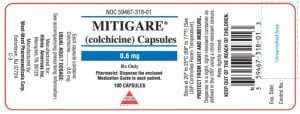Ibuprofen side effects stop some gout patients using this very popular anti-inflammatory drug. Because stomach problems are common. Now, gel or cream formulations overcome some of these ibuprofen side effects. Ibuprofen for gout is in the NSAIDs (Non-Steroidal Anti-Inflammatory Drugs) category. So NSAIDs act upon the hormones that cause gout swelling and pain.
You take ibuprofen tablets or liquid orally. Or rub gel or cream into the skin. I first took ibuprofen for gout before I knew I had it. Because I had tablets prescribed in a hospital when I was waiting to be tested and diagnosed. Then, nurses warned me that it might upset my stomach, but I was fine.
However, you might need to take tablets or liquid with milk or food to reduce the chance of stomach upset. Now that gel is available, you can reduce the risk of stomach related ibuprofen side effects. You apply the gel around the area of swelling and gently massage it into the skin. Note that you absorb ibuprofen into the bloodstream, so skin application does not reduce the risk of other ibuprofen side effects (allergy or kidney problems). The good news is you can usually gain relief with a smaller dosage when it is applied to the affected area.
Ibuprofen For Gout Dosage
In tablet form, you normally take 200 to 400 mg up to 4 times a day. You leave a minimum 4 hours between doses and a maximum daily dose of 1200 mg. You can take a higher dosage under medical supervision.
The dosage of gel and cream depends on strength. Normal strength is 5%. Some extra-strength gels are 10%. Therefore, to apply a 200mg dose you need 4 grams of normal strength gel or cream. It’s quite difficult to judge that amount. It means that a 50g tube supplies about 12 doses. I prefer the tablets due to cost.
I’ve heard that making your own cream is quite easy. Crush a 200 mg tablet and dissolve it in lemon or grapefruit juice. Then mix the dissolved ibuprofen with an ordinary cream (or even one containing a mild anesthetic such as lidocaine). Gently massage this into the affected area. Apparently, it works better than a 200 mg tablet. I haven’t tried this because I don’t suffer any ibuprofen side-effects.
Also, commercially produced ibuprofen creams are available. If you try them, please share your experience in the gout pain relief forum.
Dealing With Ibuprofen Side Effects
Over-the-counter medicines can contain similar anti-inflammatory drugs, e.g. ketoprofen, aspirin.
Do not take any other medication alongside ibuprofen without consulting your doctor.
Never exceed the prescribed dosage.
Always wait the prescribed time before taking your next dose.
If you think you have overdosed, seek emergency medical treatment immediately.
Symptoms of overdose include any of the following:
- Blurred vision
- Breathing
- Dizziness
- Drowsiness
- Headache
- Nausea
- Ringing in the ears
- Seizures
- Stomach pain
- Sweating
- Tingling or numbness
- Urine much reduced or stopped
- Vomiting
Side Effects
Not everybody suffers ibuprofen side effects. The most common problem is stomach upset, but more serious stomach problems can occur. As with all treatments, you must decide what is best for you in your particular circumstances. You must discuss side-effects fully with your doctor before you start to take any drug and whenever you experience any adverse effects.
- The following list may not be complete – if you experience any other problem that you think may be related to taking the drug, then you must consult your doctor.
-
Minor side effects that may go away
- You only need consult your doctor if these become severe or prolonged
- Constipation
- Depression
- Diarrhea
- Dizziness
- Drowsiness
- Fatigue
- Headache
- Stomach pain
- Unusual hair loss
- Nausea, unless with skin rash – this is serious – see below
- Vomiting
- Serious side effects
- You must stop taking ibuprofen and consult your doctor if you have any of the following
- Aching or painful muscles
- Blood in stools or black, tarry stools
- Blood in vomit
- Breathing troubled or short
- Bruising or bleeding without obvious cause
- Chest tight or wheezing
- Eyes yellow
- Hands or feet numb, tingling, painful or weak
- Hearing diminished or ringing in ears
- Hives
- Itching
- Lethargy (tiredness or weakness without obvious cause)
- Mouth ulcers
- Rash, especially with vomiting or nausea
- Skin yellow
- Swelling of hands, feet, lower legs or ankles
- Tarry, black stools
- Urine suddenly decreases in amount
Ibuprofen and Gout Pain

Ibuprofen works by controlling our reaction to uric acid deposits in the joints. However, though it reduces pain, it does nothing to help reduce those deposits. See the Reaction part of U-D-R-P for more information.
I use ibuprofen when I get a gout attack. It does nothing to help manage uric acid, but it does help me stay mobile. Whenever gout flares, it is important to manage the immediate pain without making long-term uric acid management more difficult. I take it so I can get mobile as soon as possible. Because the pain seems to last longer if I stay still. I’ve found that a combination of light exercise and periods of rest with the affected joint elevated works for me. I.e. take ibuprofen, rest for 20 to 30 minutes to let it take effect. Then keep moving.
Under medical supervision, I have alternated ibuprofen with acetaminophen (also known as paracetamol – brand names include Tylenol and Panadol). Panadol has a relatively little anti-inflammatory effect. It is one of the few medical pain relief treatments used with anti-inflammatories. Never mix medications unless you have the express agreement of a qualified medical practitioner.

Ibuprofen Spelling & Brand Names
Like many medicines, ibuprofen is often misspelled. Though spelling is often overrated, it pays to take extra care with medicines, as a misunderstanding might cause treatment problems in the unlikely event of a similar sounding drug being taken mistakenly.
I’ve listed common misspellings, and also included brand names. It is usually best to ask for generic medicines rather than branded ones as these are often cheaper. Everything I’ve written about ibuprofen applies equally to all the alternatives listed below.
- Ibubrofen
-
p replaced with a second b.
- Ibuforen
-
prof replaced by for.
- Ibufropen
-
prof replaced by frop.
- Ibupofen
-
missing r.
- Ibuprofen
-
This is the correct spelling of anti-inflammatory pain relief often used as a gout cure. Full details can be found in the Ibuprofen pages in the Anti-Inflammatory Gout Cure part of the Gout Treatments Section.
- Ibuprofen Brands
-
Common ibuprofen brand names include: Advil, Genpril, Ibu, Midol, Motrin, Nuprin, and Nurofen.
- Ibuprofin
-
e replaced with i.
- Ibuprofren
-
fen replaced by fren.
- Ibupropen
-
f replaced by a second p
- Ibuprophen
-
f replaced by ph. Ibuprophen is a very common alternative spelling, and sounds identical to ibuprofen when spoken.
- Ibuprophin
-
fen replaced by phin.
If you are aware of other alternative spellings, please share them in the gout forum.
Leave Ibuprofen for Gout to browse other Anti-Inflammatory Gout Cures.
Alternatively, read about all Gout Treatment options and how to manage them.
Ibuprofen for Gout Related Topics
Please remember: to find more related pages that are relevant to you, use the search box near the top of every page.
Common Terms: diarrhea, ibuprofen, spell, stomach
Other posts that include these terms:
- Probenecid in Gout Treatment
- Colcrys (Colchicine)
- Indomethacin and Gout Pain Relief
- Gout Pain Relief
- Allopurinol Introduction
- Relief From Stubborn Gout Pain
- Bismuth Subsalicylate and Gout
- Indomethacin Side Effects
Please give your feedback
Did this page help you? If yes, please consider a small donation. Your donations help keep GoutPal's gout support services free for everyone.
If not, please tell me how I can improve it to help you more.
- YouTube
- The gout forums.











